 By Miriam Raftery
By Miriam Raftery
October 18, 2009 – The House and Senate are grappling with several versions of major healthcare reform measures that could dramatically transform our nation’s healthcare system. Four of the five measures would include a public option, which give Americans a choice between private health insurance or opting for coverage under a government-run system similar to Medicare.
Where do your Congressional and Senate representatives stand? All have now taken a firm position either for or against the public option. Here are statements directly from San Diego County’s five Congressional representatives and California’s two U.S. Senators. If you wish to contact your Congressman or Senator to voice your views, you can find their contact information in our Citizens Action Center.

Democratic Senators Barbara Boxer and Diane Feinstein both urged support for a public option in an October 9th letter sent to Senate Majority Leader Harry Reid. Feinstein only recently voiced support for the public option, following a deluge of calls, letters, and e-mails urging her support.
The letter, signed by 29 Democratic Senators, notes that, states that only a public option will produce “nationwide access and ongoing cost containment,” adding, “As it stands, the health insurance market is dominated by a handful of for-profit health insurers that are exempt from the anti-trust laws that ensure robust competition in other markets across the United States. Without a not-for-profit 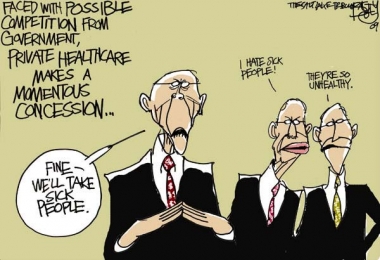 public insurance alternative that competes with these insurers based on premium rates and quality, insurers will have free rein to increase insurance premiums and drive up the cost of federal subsidies tied to those premiums. This is simply not fiscally sustainable.” The letter concludes, “The number one goal of health reform must be to look out for the best interests of the American people—patients and taxpayers alike—not the profit margins of insurance companies.”
public insurance alternative that competes with these insurers based on premium rates and quality, insurers will have free rein to increase insurance premiums and drive up the cost of federal subsidies tied to those premiums. This is simply not fiscally sustainable.” The letter concludes, “The number one goal of health reform must be to look out for the best interests of the American people—patients and taxpayers alike—not the profit margins of insurance companies.”
The Senators also voiced opposition to an alternative “co-op” insurance proposal offered in the Senate Finance Committee. “There are many areas of the country where the population is simply to small to sustain a local co-op plan,” the letter stated. “We are also concerned that the administrative costs associated with financing the start-up of multiple co-op plans would far outstrip the seed money required to establish a public health insurance program.”
 It's obvious that insurance companies need competition, with their chief executives earning average salaries of $14 million a year and their profits increasing by 400 percent from 2000 to 2007, Senator Boxer observed.
It's obvious that insurance companies need competition, with their chief executives earning average salaries of $14 million a year and their profits increasing by 400 percent from 2000 to 2007, Senator Boxer observed.
"We need competition, which is what a public option would bring us," Boxer said in an interview with the Bee. "And we need a safe haven for our citizens, so they know if all else fails and they can't get a good deal on a (private) plan, they can get a basic plan that they know will never desert them."
Republican Congressman Duncan Hunter, who represents most of East County, opposes the public option, though his website does not list his position on this issue. In a recent letter sent to a constituent, however, Hunter stated, “I do not feel a government run option is the solution, not only because of the cost, 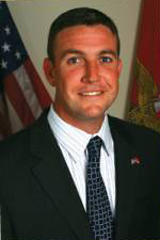 but also because this approach limits choice for consumers and the availability of quality care for those who need it most.”
but also because this approach limits choice for consumers and the availability of quality care for those who need it most.”
At a recent political forum sponsored by the East County Chamber of Commerce, Hunter said he believes there are ways to fix the system without getting rid of insurance companies and added that he wouldn’t trust government to handle healthcare when “they can’t get cash for clunkers working.” He opposes any public option or universal access but said he would support changes to make private health insurance more portable and transparent. “Reform the system, don’t crush it,” said Hunter, a military veteran who received healthcare through the Veterans Administration, a government-run healthcare system, before joining the Congress.
Democratic Congressman Bob Filner, who represents the South Bay and southern portions of East County, posted a video on You Tube voice support of a robust public health option he dubs “Medicare for all.” Filner disputes Hunter’s contention, stating, “This will increase America’s choice for healthcare coverage. It will be open to everyone regardless of income, health status, race, employment, or gender. It will provide affordable, high quality and accessible healthcare for all Americans, and they will be able to choose what doctor to go to...We will have competition with private plans and lower insurance costs for everyone…We want a public plan that makes sure everybody—everybody—gets coverage for their health insurance.” Filner said having healthcare coverage for all would enable people to see primary care physicians and get preventative care to stay out of emergency rooms, reducing costs for healthcare to society.
“In my district there are 150,000 uninsured individuals, 21% of my district,” said Filner, who added that 97% of those people will have coverage under plans currently under consideration by Congress. “If we do that, almost 130,000 more people will be covered in my district. For me, it’s a no-brainer,” said Filner. He added that he opposes recent proposals for a “trigger option” which would prevent a public option from being implemented unless certain trigger levels were met. “Any trigger, as far as I’m concerned, kills my support for the bill,” he affirmed. “We need to do this now. I am not going to vote for any healthcare reform plan that does not include a public option.”
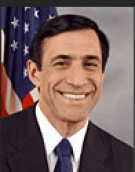 Republican Darrell Issa, who represents the northeast portion of San Diego County, notes on his website that the U.S. spends over $2.2 trillion on healthcare care each year – over 16% of the gross domestic product, yet 45 million people have no health coverage and cost is prohibitive for many. Issa believes priorities for healthcare reform should include protecting the doctor-patient relationship and people’s ability to choose their physicians and timely access to quality treatment.
Republican Darrell Issa, who represents the northeast portion of San Diego County, notes on his website that the U.S. spends over $2.2 trillion on healthcare care each year – over 16% of the gross domestic product, yet 45 million people have no health coverage and cost is prohibitive for many. Issa believes priorities for healthcare reform should include protecting the doctor-patient relationship and people’s ability to choose their physicians and timely access to quality treatment.
“Our health care system should never be taken over by the government,” adds Issa, who believes a government takeover of health care would lead to “politicians and bureaucrats in Washington making your health decisions for you.”
Despite his opposition to government-run healthcare, Issa has introduced H.R. 3438, the “access to insurance for all Americans act”, which would give people the option to buy the same health insurance coverage that Congress currently has. The Federal Employees Health Benefits Plan (FEHBP) currently has 14 national and over 310 state and/or regional health plans available to enrollees. The bill would allow for a tax deduction equal to the amount of premiums paid for coverage for the taxpayer, spouse and dependents. (The bill does not address how people who could not afford coverage, even with a tax break, should obtain health care.) Employees could take coverage with them if they change jobs. The plan would be available to all regardless of pre-existing conditions.
A second Issa measure, HR 77, would let employees reduce wages in some states by the amount paid for health insurance premiums over the federal minimum wage level. Specifically, the bill would apply in states such as California where state minimum wage is above the federal minimum wage requirement.
Issa notes that Republican-sponsored healthcare measures have not been allowed to be voted upon by the Democratic-controlled Congress.
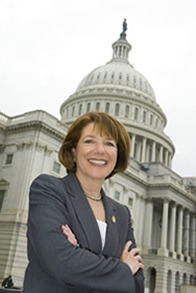 Democrat Susan Davis, who represents portions of San Diego as well as the Spring Valley vicinity, is the daughter of a physician and says the need to make health care more affordable and accessible for San Diego families was one of her key reasons for running for Congress. Davis voted in committee in favor of H.R. 3200, the Obama administration-backed healthcare reform bill which included a public option.
Democrat Susan Davis, who represents portions of San Diego as well as the Spring Valley vicinity, is the daughter of a physician and says the need to make health care more affordable and accessible for San Diego families was one of her key reasons for running for Congress. Davis voted in committee in favor of H.R. 3200, the Obama administration-backed healthcare reform bill which included a public option.
“The goal of H.R. 3200 is to control skyrocketing health care costs while extending access to the 47 million uninsured Americans,” a statement on Davis’ website reads. “Premiums for health insurance have doubled for individuals and families since 2000. Further, without action, Medicare will become insolvent during the next decade.” Davis voted in favor of the bill in committee to provide access to those without coverage and reduce health care costs. But her website statement adds that Davis “remains concerned about some of the provisions of the bill, including the overall cost of the package and the impact of proposed reductions to Medicare and Medicaid funding on Callifornia’s hospitals.”
Davis has also expressed concern over the need to make sure that healthcare reform not impose burdens on small businesses and is advocating for resolution of those issues before a final bill is voted upon by the full House. Her website includes a list of common questions and answers regarding HR 3200, the healthcare reform bill backed by the Obama adminstration.
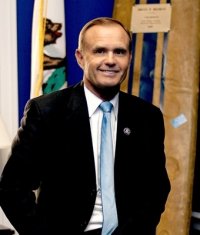 Republican Congressman Brian Bilbray’s district includes coastal areas as well as portions of some inland communities including Escondido and Rancho Bernardo. “While I believe we need to make changes so that more people can have access to quality health care, I disagree with my colleagues who believe the federal government can do this by forcing a nationalized system of health care upon we, the citizens,” Bilbray states on his website. Bilbray believes nationalized healthcare delivery could lead to longer patient wait times and under-funding of physicians. “I will not support any nationalized system of health care that does not include tort reform and malpractice insurance reform,” he said.
Republican Congressman Brian Bilbray’s district includes coastal areas as well as portions of some inland communities including Escondido and Rancho Bernardo. “While I believe we need to make changes so that more people can have access to quality health care, I disagree with my colleagues who believe the federal government can do this by forcing a nationalized system of health care upon we, the citizens,” Bilbray states on his website. Bilbray believes nationalized healthcare delivery could lead to longer patient wait times and under-funding of physicians. “I will not support any nationalized system of health care that does not include tort reform and malpractice insurance reform,” he said.
Bilbray’s website indicates he would support health care reforms to expand access, increase quality and increase investment in U.S. companies that create “innovative solutions” to our nation’s health care challenges. He also supports private insurance reform to allow patients to cross state lines to buy insurance and to enable small businesses to work together to purchase health insurance plans competitive to larger company plans. “We can fix the system without letting bureaucrats gain more control over our lives,” Bilbray concluded.
To view the latest versions of the Obama administration measure, H.R. 3200, click here.
To contact your Congressional or Senate representatives, click here.









Recent comments